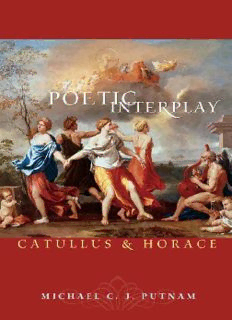
Poetic Interplay: Catullus and Horace (Martin Classical Lectures, New Series) PDF
Preview Poetic Interplay: Catullus and Horace (Martin Classical Lectures, New Series)
Poetic Interplay MARTIN CLASSICAL LECTURES ■ ■ The Martin Classical Lectures are delivered annually at Oberlin College through a foundation established by his many friends in honor of Charles Beebe Martin, for forty-five years a teacher of clas- sical literature and classical art at Oberlin. John Peradotto, Man in the Middle Voice: Name and Narration in the Odyssey Martha C. Nussbaum, The Therapy of Desire: Theory and Practice in Hellenistic Ethics Josiah Ober, Political Dissent in Democratic Athens: Intellectual Critics of Popular Rule Anne Carson, Economy of the Unlost (Reading Simonides of Keos with Paul Celan) Helene P. Foley, Female Acts in Greek Tragedy Mark W. Edwards, Sound, Sense, and Rhythm: Listening to Greek and Latin Poetry Michael C. J. Putnam, Poetic Interplay: Catullus and Horace Poetic Interplay Catullus and Horace Michael C. J. Putnam princeton university press princeton and oxford Copyright © 2006 by the Trustees of Oberlin College Requests for permission to reproduce material from this work should be sent to Permissions, Princeton University Press Published by Princeton University Press, 41 William Street, Princeton, New Jersey 08540 In the United Kingdom: Princeton University Press, 3 Market Place, Woodstock, Oxfordshire OX20 1SY All Rights Reserved Library of Congress Cataloging-in-Publication Data Putnam, Michael C. J. Poetic interplay : Catullus and Horace / Michael C. J. Putnam. p. cm.—(The Martin classical lectures) “Expanded version of the Charles Beebe Martin Classical Lectures, delivered at Oberlin College in March 2004”—Pref. Includes bibliographical references (p. ) and indexes. ISBN-13: 978-0-691-12537-4 (acid-free paper) ISBN-10: 0-691-12537-6 (acid-free paper) 1. Horace—Knowledge—Literature. 2. Helen of Troy (Greek mythology) in literature. 3. Catullus, Gaius Valerius—Influence. 4. Influence (Literary, artistic, etc.) 5. Odes—History and criticism. 6. Virgil—In literature. 7. Rome—In literature. I. Title. II. Martin classical lectures (Unnumbered). New series. PA6411.P84 2006 874'.01—dc22 2005054516 British Library Cataloging-in-Publication Data is available This book has been composed in Sabon Printed on acid-free paper. ∞ pup.princeton.edu Printed in the United States of America 10 9 8 7 6 5 4 3 2 1 for Kenneth Gaulin This page intentionally left blank Contents Preface ix Introduction 1 Chapter One Time and Place 11 Chapter Two Speech and Silence 48 Chapter Three Helen 72 Chapter Four Virgil 93 Chapter Five Genres and a Dialogue 116 Conclusion 141 Notes 145 Bibliography 159 Index of Poems Cited 165 General Index 169 This page intentionally left blank Preface This is the first book-length study of the influence of the poetry of Catul- lus, whose lifespan extended from approximately 95 to 54 BCE, on the work of Horace, who was born eleven years before his predecessor’s death and who lived until 8 BCE. It is only a beginning. For one thing, the book’s primary focus is on the Carmina. There is scant mention of the Epodes or of Horace’s hexameter poetry, though here, too, the pres- ence of Catullus is as strongly, if not as universally, felt as upon his lyric output. For another, the project itself by its nature can never be consid- ered complete. More allusions will continue to be noted and their rich- ness explained. Many of the suggestions presented in the subsequent chapters will no doubt be deepened or rethought. At best, as with any work of practical criticism, what follows can serve only as one example out of many ways to approach a subject, scrutiny of which must be ever ongoing. It will achieve its goal if it stimulates further research into, and enhances our appreciation of, the extraordinary dialogue between two of Rome’s greatest poets—a dialogue that has as much to tell us about the earlier poet as it does about his emulator. Though this is the first detailed survey of the complementarity be- tween Catullus and Horace, there have been many individual studies devoted to particular examples of verbal interaction between the two poets. These stretch from analyses of individual words to critiques of whole poems and groups of poems. I have endeavored to acknowledge, in the notes and in the bibliography, the many debts that my work owes to previous investigations of the topic. I can only appeal to the extensive nature of the scholarship involved as excuse for the omissions that will have occurred. The book is an expanded version of the Charles Beebe Martin Classical Lectures, delivered at Oberlin College in March 2004. I am honored to have been chosen as the sixty-seventh presenter in a series initiated in 1931, and I am grateful to Thomas Van Nortwick and to the other mem- bers of the Martin Committee for their invitation. The warm, attentive hospitality of the faculty of the college’s Classics Department and its asso- ciates in other fields left nothing to be desired, and would have been ap- plauded by the two authors who form the subject of the pages that follow. The fifth chapter is an expanded version of a paper, entitled “Catullus and Horace: Some Questions of Genre,” delivered at the University of Chicago in February 2004.
Description: